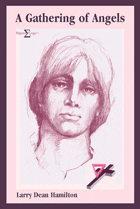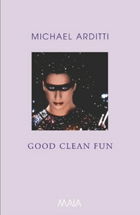 Our man from England, Tony Heyes, reviews three books this issue
Our man from England, Tony Heyes, reviews three books this issueA Gathering of Angels by Larry D. Hamilton
Good Clean Fun by Michael Arditti
The Movie Lover by Richard Friedel (see page 12)
Contact Tony if you would like for him to review your book.
  A Gathering of Angels A Gathering of AngelsBy Larry Dean Hamilton Published by SigmaΣLogoTM 2004 ISBN 0-9754321-0-9 These are distressing times for gay people with religious sensibilities. A great and good religious leader once remarked that the world is divided into zealots and wise men. Unfortunately the world’s three great monotheistic religions seem to be in the control of the zealots; the lunatics have taken over the asylum. God, who we were formerly told is love, has been turned by his self-appointed commissars on earth into an avenging angel concerned only with bringing deviants into line. Conformity with the norm is compulsory. The exuberant and luxuriant variety of Creation is to be replaced with the uniformity of a police state. One size must fit all. There are no shades of grey, only black and white. No gay person can subscribe to this view. Larry Dean Hamilton’s autobiographical book, A Gathering of Angels, is an account of his search for love, which for him has been a spiritual quest. In a sense it is a search for God, for union with the infinite. He has intuited what a Thomist theologian would teach, namely, our inability to satisfy our wants is a proof of the existence of God. Finite beings, we have infinite longings that can be met only by Him. In love we find Him. Mr Hamilton does not put it like this of course since, like most gay people, he has had to make his journey outside society’s orthodoxies and reach his own conclusions. To today’s love police he is a heretic. A Gathering of Angels is a difficult book, but a riveting one too. Difficult because Mr. Hamilton’s poetic style, with its occasional omissions of the definite and indefinite articles and other minor parts of speech, and its painful subject matter, serve to slow the reader down: riveting because, like all life stories it is intrinsically interesting and gives much food for thought. In addition, it is in many ways the story of our times. Mr. Hamilton and I, on the evidence of this book, were born within weeks of each other. We have led parallel lives, so it has been of great personal interest to be in a position to compare and contrast our life experiences. His upbringing was rural, mine resolutely urban. I smiled with recognition at his being taunted at school at the age of six for wearing “girl’s shoes”. I was similarly ragged at the same age for wearing a “girl’s blouse”, a fetching short-sleeved number with blue and white stripes of which I was particularly fond. He was upset; I thought my schoolmates were tasteless idiots. Herein lies the difference. Mr. Hamilton has related to the world with much greater immediacy and feeling than I have ever done. Perhaps the reasons are temperamental, perhaps cultural. He has always been resolutely “out”, I determinedly tight-lipped (although I did join the Campaign for Homosexual Equality in 1971, an act that, according to the Primate of Scotland, put me in the same moral category as a Nazi bomber). That said, moving in with another man was perhaps a dead give away in my case. My partner and I have been together for thirty-three years now and we have always gone about as a pair; most of our friends are, at least ostensibly, straight. Being English, they’d think it rude to pry. In any case, we developed formidable personae to cope with such difficulties as we had. (“Go and put the fear of God in him – like you do in me” our lawyer once advised when we were having trouble with a realtor.) Although the social climate in Britain has mirrored that of the U.S. – our Thatcher to your Reagan – individual experiences have been in many ways less harsh and the situation has greatly improved in recent years. All this is by way of saying that one’s reality is essentially subjective. The world we live in is very much a psychological construct of our own devising. We can choose to accept the parameters determined by the society in which we find ourselves, or we can reject them and write our own rule book. In our different ways Mr. Hamilton and I have done the latter. Mr. Hamilton came out with a bang around the time JFK was killed and, as he recognises in retrospect, embarked on his search for love. Unfortunately love, like happiness, cannot be pursued; it comes unsought and unbidden, usually as a by-product of something else. Focussing mainly on his college years, he writes fondly of all the young men for whom he has had deep feelings and ruefully of his missed opportunities. At college he met many remarkable, emotionally grounded young men, and a few flaky characters. That so many of his relationships ran into the sand is a puzzle to him. We have all been similarly puzzled by the unpredictability of our fellow humans and can only sympathise. He had a lot to offer and few appreciative takers. Throughout his life, however, he has been sustained by certain mystical experiences. He recognises that in admitting this he is laying himself open to accusations from sceptics that he has been at the metal polish but, as he himself is the first to point out, the reader has to take these manifestations on trust. Indeed, the book was prompted by one such revelation. If he is to present an honest account of his quest he has to present his reality. No one can criticise him for so doing and none of us can claim to have led a life entirely devoid of troubling glimpses of the seemingly irrational. That he tells us of these experiences is a mark of his integrity; that they have been more vivid than many is a mark of his depth of feeling. Essentially, A Gathering of Angels is only a partial autobiography. I would have liked more. Mr. Hamilton deals with his inner life almost in a vacuum. Although his tale is framed by his ACTUP experiences at the Houston Republican Convention, his public life remains shadowy. He gives only fragmentary glimpses of his family background and few of his intellectual hinterland. The Baptist Church is mentioned cursorily as part of his childhood but its significance to his later life, if any, is not apparent to those of us unacquainted with that denomination (in Britain Baptists are an endangered species). We lack sufficient context fully to appreciate his journey. He has clearly had a successful career and played a significant role in the world of work, yet we learn nothing of this. That said, this is an intriguing book which leaves us wanting more, an honest account of one attractive personality’s attempt to live an examined life and a rewarding and thought-provoking read. I hope Mr. Hamilton will shortly feel impelled to give us a more rounded picture of his clearly full life and fascinating experiences. |
  Good Clean Fun Good Clean Fun by Michael Arditti Published by MAIA 2004 ISBN 1 9045590 8 5 Variety is said to be the spice of life. If that is the case, Michael Arditti’s collection of short stories, Good Clean Fun, is a very spicy collection. Mr. Arditti presents a dozen stories of varying length that have in common only their excellence and sureness of touch. Each conveys with great economy a completely different mood, situation or point of view from the other. The collection opens with Uncle Brian which is written from an abused child’s point of view. The child does not realise he is a victim and pines for his abuser, the only person who has placed him at the centre of his world. The literal-mindedness and only partial understanding of a child in an incomprehensible world is brilliantly captured. This is one very disturbing but masterly tale. Good Clean Fun, the story that gives the book its title, is a monologue, the transcript of the performance of a gay comedian slowly coming apart on stage. Elements of several English camp comedians are recognisable – Frankie Howerd (“She said, ‘I’ve just been raped by an idiot’. I said ‘What do you mean, you’ve just been raped by an idiot?’ She said, ‘I had to show him what to do.’ No, don’t laugh. You mustn’t. It’s wicked to mock the afflicted”), Kenneth Williams (“Infamy! Infamy! They’ve all got in infamy!”) and Larry Grayson (“I’ve done Rose Marie. I’ve done the Maid of the Mountain. I’ve done Naughty Marietta. I didn’t touch the Chocolate Soldier”) are clearly in there – and the man struggles gamely to stick to his routine while what is really happening to his life keeps forcing its way into his material. As a picture of how many gay people “wear the mask”, as Bertie Wooster would say, whilst fighting to survive, Good Clean Fun is both funny and moving. Haverstock Hill is a salutary tale of advertising for a partner. Simon, the central character, answers an advertisement in a magazine, to which a young man responds by telephoning him. Simon contrives a meeting to take the young man, Will, by surprise and is crestfallen when Will is clearly disappointed by what he sees. For several months afterwards his confidence is so shaken he retreats into solitude until a female friend insists that he pulls himself together. As a brief vignette on the perils of being an observer of life instead of a participant it is both funny and sad. Mr. Arditti’s stories have a laser-like accuracy when it comes to depicting self-knowledge and self-deceit and the stratagems people adopt to get them through life. Visiting Hour is a wonderfully poignant example of this. Saving face, to oneself as well as to others, is something with which we are all familiar. The wearing of masks is common to us all, at some time or another, and the need to minimise the personae we present to the world if we are to be at all integrated personalities is tellingly explored in a number of stories. Only in the dark watches of the night, he seems to suggest, are some people able to deal with reality. In the harsh light of day it is easier, and less painful, to pretend that everything is for the best in the best of all possible worlds, rather than that life is a bitch and then you die. This collection of stories is perceptive as well as entertaining and I, for one, will be looking out for more by this author. |